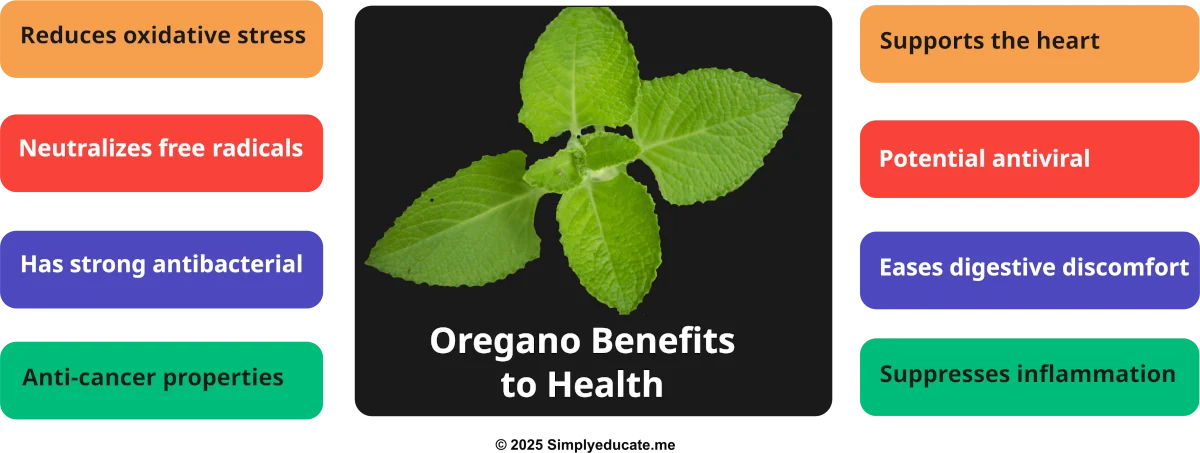
Oregano benefits are many. Known scientifically as Origanum vulgare, oregano delivers an array of benefits—from culinary delight to potential health-supporting effects. This herb is safe when used in normal cooking amounts; however, excessive intake or using concentrated forms like oregano oil may present risks.
Read the article for more details.
Table of Contents
Culinary Uses of Oregano
Oregano has been used for centuries in cooking, especially in Mediterranean and Italian cuisine. Its strong, slightly bitter flavor enhances a variety of dishes. Among its popular uses as part of its traditional role in cooking include the following:
- Seasoning: Commonly added to pizza, pasta, soups, and stews in dried or powdered form, giving dishes a bold Mediterranean taste.
- Tomato-based dishes: Oregano pairs especially well with tomato sauces, roasted vegetables, and grilled meats, usually in dried or oil form for stronger flavor.
- Fresh oregano: Sprinkled as a garnish or mixed into salads, adding a burst of fresh herbal aroma.
- Dried oregano: Blended into sauces, marinades, or rubs for meats, allowing flavors to deepen during cooking.
7 Oregano Benefits to Health
1. Reduces Oxidative Stress and Neutralizes Harmful Free Radicals
Oregano benefits include a high content of antioxidants like carvacrol and thymol, which help reduce oxidative stress by neutralizing harmful free radicals. These compounds are especially concentrated in oregano essential oil, giving it potent antioxidant capacity even in test-tube studies (Ajmera, 2017).
2. Has Strong Antibacterial Power
One of the key oregano benefits is its strong antibacterial activity. Lab studies reveal that oregano essential oil effectively inhibits both Gram-positive and Gram-negative bacteria, with carvacrol demonstrating particularly low minimum inhibitory concentrations—indicating potent action even at small doses (Tao et al., 2025).
3. Contains Anti-Cancer and Neuroprotective Properties
Oregano benefits extend to anti-cancer and neuroprotective properties, driven primarily by carvacrol’s ability to regulate critical cellular pathways like mTOR and MAPK. Animal and cell-based studies suggest it could reduce tumor cell proliferation and support neuron health (Malesu, 2025).
4. Has Potential Antiviral Effects
Another significant oregano benefit is its potential antiviral capacity. In test-tube experiments, carvacrol and thymol were shown to rapidly inactivate viruses such as norovirus and herpes simplex, pointing to possible effectiveness in viral control (Ajmera, 2017).
5. Supports the Heart and Blood Vessels and Modulate Blood Sugar and Fats
Oregano benefits may also include supporting cardiovascular and metabolic health. Preliminary literature review indicates that oregano extracts may help regulate inflammation, modulate blood sugar and lipid levels, and promote vascular health—though human clinical trials are still limited (Singletary, 2025).
6. Eases Digestive Discomfort and Boosts Immunity
Among the most common oregano benefits, the herb is traditionally used to ease digestive discomfort and bolster immunity. It may support gut health by promoting digestion, relaxing intestinal muscles, and inhibiting unwanted microbes; these benefits, however, remain primarily supported by lab and anecdotal evidence (Cleveland Clinic, 2025).
7. Suppresses Inflammation
Oregano benefits include reducing inflammation, thanks to compounds like carvacrol and rosmarinic acid. These constituents may suppress inflammatory pathways and shield cells from oxidative damage—though much of the evidence comes from laboratory research rather than human-based studies (Ehsani, 2025).
Possible Side Effects of Oregano
Although oregano is safe in small amounts, high doses or concentrated oregano oil can cause adverse reactions such as:
- Gastrointestinal issues: Indigestion, stomach pain, diarrhea, or heartburn.
- Allergic reactions: Possible in people allergic to herbs in the Lamiaceae family (mint, basil, sage). Symptoms may include rashes, itching, breathing difficulty, or even anaphylaxis. Anaphylaxis is an acute allergic reaction to an antigen (like those found specifically as a curative compound in oregano) to which the body has become hypersensitive.
- Skin irritation: Undiluted oregano oil may cause burning or redness.
- Drug interactions: Can interfere with blood thinners or diabetes medications, increasing bleeding risk or altering blood sugar levels.
- Pregnancy and breastfeeding risks: High doses may stimulate the uterus or affect lactation.
- Impaired nutrient absorption: May reduce iron absorption if consumed excessively.
Precautions and Safe Use
To reduce risks:
- Use oregano in moderation in food.
- Dilute oregano oil before applying it to the skin.
- Consult a healthcare provider before using oregano supplements, especially if you have medical conditions or take prescription medications.
References
Ajmera, R. (2017). 6 Science-Based Health Benefits of Oregano. Healthline. https://www.healthline.com/nutrition/6-oregano-benefits
Cleveland Clinic (2025, August 28). 8 Potential Health Benefits of Oregano. Cleveland Clinic. https://health.clevelandclinic.org/oregano-benefits
Ehsani, R. (2025). EatingWell. Retrieved September 7, 2025, from https://www.eatingwell.com/oregano-oil-benefits-11723453
Singletary, K. (2010). Oregano: overview of the literature on health benefits. Nutrition Today, 45(3), 129-138.
Tao, L., Liang, Y., Xia, Z., Wang, X., Wang, X., Chao, Z., & Guo, J. (2025). Antibacterial activities of oregano essential oils and their active components. Frontiers in Pharmacology, 16, 1579283.
Vijay Kumar Malesu (2025, August 3). News-Medical. News-Medical. https://www.news-medical.net/health/Oregano-vs-Thyme-Which-Herb-Offers-Stronger-Antioxidant-and-Health-Effects.aspx
FAQ
1. What are the main oregano benefits?
Oregano benefits include antioxidant, antibacterial, antiviral, anti-inflammatory, and digestive support properties. It may also promote heart health, support immunity, and aid in managing cholesterol levels.
2. How is oregano commonly used in cooking?
Oregano is used fresh or dried. Fresh oregano is added to salads or used as a garnish, while dried oregano is blended into sauces, soups, stews, marinades, and tomato-based dishes such as pizza and pasta.
3. Can oregano help with infections?
Yes, oregano contains compounds like carvacrol and thymol that have strong antibacterial and antiviral properties. These may help the body fight harmful microbes, though most studies are based on lab and animal models.
4. Is oregano safe to consume daily?
Oregano is safe in normal food amounts. However, excessive intake or concentrated oregano oil may cause side effects such as stomach upset, skin irritation, or drug interactions.
5. Who should avoid taking oregano supplements or oil?
Pregnant or breastfeeding women, individuals with allergies to mint-family herbs, or those taking blood thinners or diabetes medications should exercise caution and consult a doctor before use.




